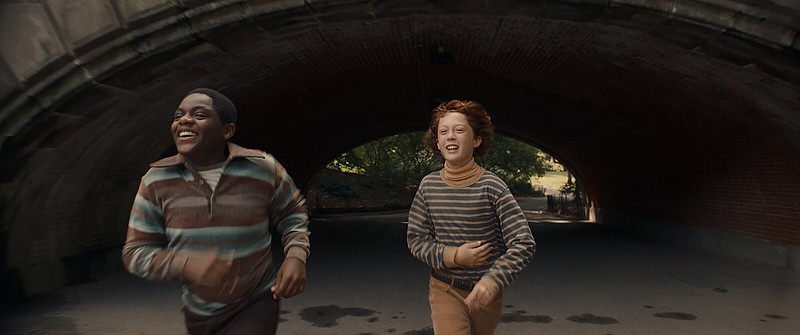One of the biggest satisfactions from James Gray's new coming-of-age drama "Armageddon Time" is unpacking it afterward -- peeling back the layers and sorting through the various memories the filmmaker attempts to explore. If only watching the movie carried the same sense of fulfillment. Despite being a deeply personal film for Gray, it doesn't always feel like it. Some scenes unquestionably bear the filmmaker's mark. Others have an overly familiar studio product feel. Still, it does have its saving graces.
"Armageddon Time" is heavily influenced from Gray's childhood growing up in Queens, and he does a good job re-creating that time and place. Opening in 1980, this memoir of sorts begins in a public classroom on the first day of school. Paul Graff (Banks Repeta), an 11-year-old aspiring artist and class clown, meets and befriends his new classmate Johnny (Jaylin Webb), a fellow disruptor working on his second year in sixth grade.
The two boys have an interesting dynamic. Paul is Jewish-American and comes from a fairly stable working class family. Johnny is one of the few Black kids in the school and lives with his ailing grandmother. The roots of their mischievousness is dramatically different, yet both find a partner in crime in each other. But that doesn't mean they're good together, which leads to a nagging conflict within the movie.
Gray has a hard time balancing our sympathy with the boys' delinquency. We feel for them whenever we're shown the harsher side of their upbringing. But their blatant disrespect and troublemaking (which steadily worsens whenever they're together) doesn't exactly have the effect Gray is shooting for. The most compelling aspect of their relationship is in how differently the two are treated for their misbehavior, whether it's by their teacher, Mr. Turkeltaub (Andrew Polk) or the cops. This is where the film's sometimes shaky racial politics is its most effective.
The scenes at Paul's home play like a tapestry of memories that Gray has passionately stitched together. Paul's family are proud but insular Jewish liberals who happily take snide shots at Ronald Reagan every time he pops up on the television, yet are blind to their own racism that surfaces whenever they talk about "the blacks." His uptight mother, Esther (Anne Hathaway) is the president of the PTA and absorbed in her desire to run for the school board. His hard-shelled father, Irving (Jeremy Strong) is a repairman with a notable bad temper but who may be a good guy underneath (It's hard to tell. He's haphazardly written and more of a sketch than a portrait). Then there's Paul's one-note jerk of an older brother Ted (Ryan Sell) who attends a private high school and does nothing more than antagonize.
While Paul is cold to his mother (something vaguely explained but not in a satisfying way) and fearful of his father (which is realized through one particularly harrowing scene), the lone family member he's closest to is his grandfather, Aaron (Anthony Hopkins). Paul is honest and open with his grandpa. And much like the boy, we light up whenever Hopkins shows up on screen. The film's most tender and heartfelt moments feature Hopkins and his signature blend of charisma and warmth. And Aaron may be the movie's most interesting character, with wisdom and perspective shaped by his family's history with the Holocaust.
The film's flaws are more pronounced in the second half as Johnny's story fades to the background, and Gray ventures off into other thematic weeds. A chunk of it follows Paul as he's sent to the uppity Kew-Forest prep-school, where businessman Fred Trump (John Diehl) sent his children, future president Donald and US Appellate Judge Maryanne (played briefly by Jessica Chastain). Gray uses these scenes to highlight the era's class and race clash, attempting to connect it to the Reagan years and more lazily the Trump presidency. But it's more vague assertions than thoughtful consideration.
It culminates in an unfortunate final scene that's well-intended but ends up making Johnny's entire story a means to give Paul (and perhaps Gray himself) this big moment of self-congratulatory clarity. It's a sour note to end on, and one that leaves you reconsidering some of the weightier stuff that came before it, particularly in its dealings with race.
Something Gray does very well is show us things from Paul's perspective. From his conversations with his peers to the way the adults speak around him, we get a good understanding of how a kid can perceive the world through what he sees and hears from others. I also enjoyed pointing out the nostalgic early 1980s details (Paul's Six Million Dollar Man lunchbox, "Private Benjamin" showing at the cinema, etc.).
But in the end, Gray simply has too much on his mind and gets trapped in between reflecting on his childhood and offering a politically charged critique. There's some material there for each, but not enough to juggle both. It's hard to stay connected emotionally, despite another sterling and effective performance from Anthony Hopkins. And in terms of its messaging, "Armageddon Time" remains surprisingly inert, and no amount of shallow sermonizing and self-implication can give it the heft it's so desperately after.
More News
None‘Armageddon Time’
82 Cast: Anne Hathaway, Jeremy Strong, Anthony Hopkins, Banks Repeta, Jaylin Webb, Tovah Feldshuh, John Diehl, Andrew Polk, Ryan Sell, Jacob Mackinnon Marcia Jean Kurtz, Domenick Lombardozzi
Director-screenwriter: James Gray
Rating: R
Running time: 1 hour, 54 minutes
Playing theatrically
